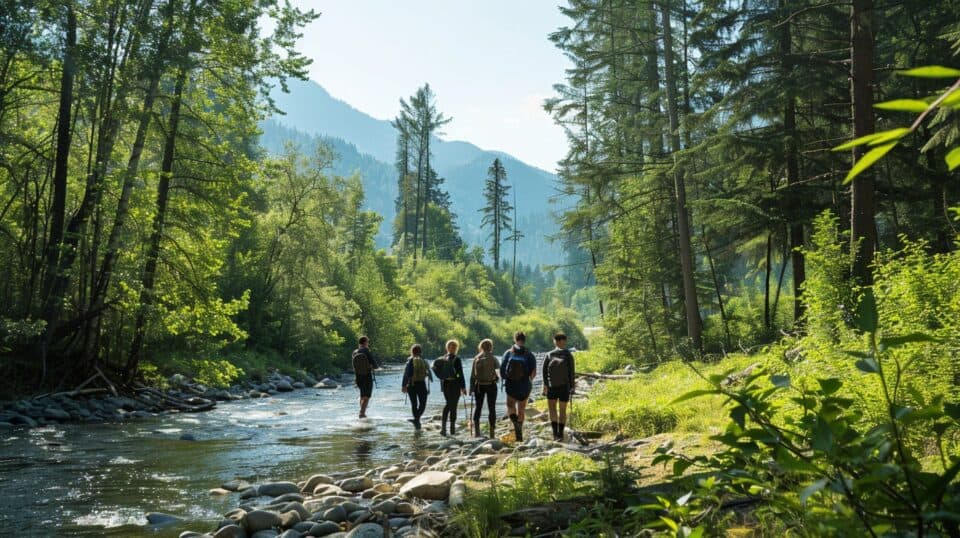Teams today face many challenges. Work retreats show we value our teams and help us grow together. This article offers 10 new ideas for a work retreat in 2024, promising teamwork and fun.
Read on to discover how.
Key Takeaways
Work retreats are special events where team members bond and grow outside the office. They can last a few days and include activities like hiking, cooking classes, and escape rooms to make teams stronger.
A no-tech day helps teams focus on talking face-to-face and working together without phones or laptops. It’s good for creative thinking and building real connections.
Cooking together in a class teaches communication and teamwork, as everyone has a part to play in making a meal. This turns cooking into fun group learning.
Zip-lining is an adventure that builds trust among coworkers because they cheer each other on while flying through the air.
Planning the perfect work retreat means balancing active time with rest, choosing the right place, making sure food fits everyone’s needs, and including quiet moments to help team members connect better.
Table of Contents
Defining a Work Retreat

A work retreat is a planned, off-site event where employees and management come together outside their usual office space. Its main goals are to strengthen team bonding, improve communication skills, and boost company spirit.
Activities during these events range from brainstorming sessions to outdoor adventures, all designed to build stronger relationships among colleagues. These retreats can last anywhere from one day to several days and might include everyone in the company or specific groups.
Work retreats are more than just breaks from the daily grind; they’re investments in a company’s culture and its people’s well-being. They show appreciation for team members’ hard work by offering time for reflection, renewal, and fun alongside workmates. These activities also teach high ranking employees how to develop team management skills.
With clear objectives like enhancing teamwork abilities and uplifting morale, these getaways serve as essential tools for fostering a supportive environment where creativity and productivity thrive.
Planning your ideal work retreat starts with understanding why bringing your team together matters.
Team Building and Collaboration: Why It Matters

Team building and collaboration are key to a strong company culture. They boost communication and inspire teamwork, making sure everyone feels valued. This unity leads to better problem-solving and decision-making across the team.
With activities like escape rooms and cooking classes, workers learn to trust each other’s strengths.
These shared experiences are not just fun—they teach important lessons in leadership and cooperation that apply back at work. For example, solving puzzles together or planning a trivia night requires quick-thinking and clear communication, skills essential for any successful project.
By focusing on these moments of togetherness, companies see real improvements in how their teams perform together, turning individual efforts into collective achievements.
Innovative Retreat Ideas for Enhanced Team Building and Collaboration

For boosting team spirit and fresh thinking, try these retreat ideas on the 5 stages of team development — from no-tech days to puzzle challenges. Explore retreat venue options for the best experience.
Disconnecting: A No-tech Retreat Day
On a No-tech Retreat Day, everyone puts away their phones, laptops, and gadgets. This day makes the team focus on face-to-face talks and outdoor activities. It’s about getting back to basics and enjoying simple things like nature walks or icebreaker games without digital distractions.
Teams learn to work together in new ways that don’t need screens.
A day without tech opens up space for creative thinking and real connections.
This retreat boosts morale by showing how well we can communicate and solve problems when we’re not staring at our devices. Activities might include scavenger hunts through natural settings or group challenges that require teamwork.
The goal is to build stronger bonds by sharing experiences that are not mediated by technology, but rather inspired by direct interaction and the environment around us.
Exploring Together: A Hiking Trail Adventure
Hiking trail adventures create stronger teams. Walking through nature, teams solve problems and share laughs. It’s not just fun; it’s a chance to connect outside office walls. We learn about each other by tackling trails and enjoying the outdoors together.
I once joined a team hike where we had to navigate through dense woods. The experience brought us closer as we took turns leading and supporting each other. This adventure made our bond solid, proving teamwork in action beats any indoor activity for building trust and collaboration.
Urban Exploration: A City Tour Adventure
Urban exploration sparks team spirit and collaboration in a unique way. Teams discover hidden gems of the city, turning every corner into an adventure. They learn history, see new sights, and solve clues together.
This boosts morale and fosters company pride.
Outdoor activities like zip-lining or boating add excitement to urban retreats. Icebreaker games make everyone feel welcome and connected from the start. Such experiences energize colleagues.
They share laughs and build bonds that last beyond the city streets.
Culinary Teamwork: A Group Cooking Class
A group cooking class pulls everyone together. Team members chop, mix, and cook side by side. This builds communication and teamwork. I’ve seen quiet team members open up and lead a recipe step.
Others learned to trust their teammates’ skills in crafting dishes. The kitchen becomes a place of laughter, learning, and shared victories over perfectly baked cookies or beautifully plated mocktails.
Cooking together turns recipes into bridges between people.
Next is an adrenaline-pumping zip-line experience that challenges fears and builds trust among team members.
Soaring High: Zip-line Team Experience
Zip-lining lets teams fly through the sky, offering a thrilling adventure that strengthens bonds. Leah Knobler from Help Scout sees it as key for team building — it mixes fun with unforgettable memories.
Flying together, coworkers build trust and share a unique experience.
This outdoor activity takes you high above the ground, moving fast on a cable. Teams cheer each other on, overcoming fears and boosting morale. It’s perfect for groups looking for something different than typical office outings.
Plus, sharing this exhilarating moment can spark conversations and connect people in new ways.
Solving Puzzles: Escape Room Team Challenge
Solving puzzles together strengthens team bonds. Escape room challenges do just this by putting groups in themed rooms. Here, they solve clues to “escape” within a set time. This activity boosts critical thinking and communication among teammates.
Help Scout saw its teams grow closer through these challenges. Tasks in escape rooms require everyone to work together, share ideas, and listen closely. It turns individual players into united teams, ready to tackle any problem with confidence.
Competitive Spirit: A Team Sports Day
After testing their minds in escape rooms, teams can shift gears towards physical activity. A Team Sports Day fuels the competitive spirit with activities like beach volleyball and kayaking.
These sports are not just fun; they also strengthen teamwork and encourage healthy competition among team members.
Beach volleyball games require coordination and strategy, while kayaking demands teamwork to navigate waters smoothly. Both activities push teams to work together under a different set of challenges than they face at work, making for a memorable retreat experience.
They offer an exciting way to build trust and improve communication skills outside of the office environment.
Embrace the challenge, enjoy the air, and team up for victory on your next corporate retreat.
Taste and Learn: Brewery Tour Exploration
Moving from team sports to a more relaxed setting, our next stop is the brewery tour. This activity takes teams through the art of making beer. Here, you learn how breweries mix grains, hops, and water to create different types of beers.
It’s not just about tasting; it’s an educational journey too. Our group discovered four main brewing stages and tasted five unique beers.
This tour stands out because it mixes fun with learning. You chat with brewers, ask questions, and see machines up close. We laughed over shared tastes — some loved the stouts, while others preferred lighter ales.
Plus, discussing flavors boosted our teamwork outside work talk. This experience showed us that relaxing together can build strong connections and fresh ideas for work projects ahead.
Open Dialogue: Unconference Team Discussions
Open dialogue at work retreats brings teams together. It’s all about having talks without a strict plan, encouraging everyone to share ideas and thoughts. This method invites reflection, renewal, and stronger teamwork—key goals of any retreat.
Picture sitting in a circle with your team, discussing everything from project challenges to personal growth strategies. These sessions foster trust and open-mindedness.
These unconference discussions use simple tools like whiteboards for brainstorming and sticky notes for voting on topics. I’ve seen firsthand how this setup breaks down walls between different levels of employees.
Suddenly, the new intern might share an insight that leads to a big breakthrough on a project. Next up: why not add some excitement with a Mystery Dinner Team Night?
The Unexpected: Mystery Dinner Team Night
After discussing open dialogues, let’s move to something thrilling. Mystery Dinner Team Night stands out as an engaging retreat idea. This night is full of surprises where team members meet at unknown locations.
They enjoy a meal while solving a mystery together. It boosts communication and strengthens bonds.
I attended one such dinner with my team last year. We were grouped and sent clues about where to find our next hint in the city. The goal was clear—solve the puzzle before dessert.
By night’s end, we learned new things about each other and worked better as a unit than before, proving it enhances teamwork and morale efficiently.
Planning Your Ideal Work Retreat

To plan the perfect work retreat, start by picking a spot that everyone will enjoy. Think beaches, mountains, or city lights… Then, make sure the agenda allows for both fun activities and chances to relax together.
This balance keeps the team happy and bonded.
Fostering Team Collaboration
Fostering team collaboration means getting everyone to work well together. It’s about making sure people talk, share ideas, and solve problems as a group. Work retreats play a big role in this.
They bring teams out of the office and into new settings where they can connect in different ways. For example, during a no-tech day, teams learn to rely on direct communication instead of emails or chats.
In an escape room challenge, they must think together to find solutions.
To make these retreats work, plan activities that involve everyone. Choose a cooking class where each person has a part, or a sports day with mixed skill games—these experiences help break down walls between team members.
The goal is clear: improve how we talk and work with each other for better results back at the job. This approach turns groups into tight-knit teams ready to tackle any project.
Crafting a Balanced Retreat Schedule
Crafting a balanced schedule is key for a successful work retreat. It ensures everyone enjoys the activities while still grabbing some rest.
- Start early with mindfulness. Begin each day with meditation or light yoga. This wakes up the body and mind, preparing them for the day ahead.
- Breakfast together. Plan a healthy group breakfast around 8 am. Sharing meals builds camaraderie.
- Morning team-building exercise starts at 9:30 am. Choose activities that boost teamwork, like a scavenger hunt or problem-solving games.
- Break for refreshments at 11 am. Serve snacks and beverages to keep energy up.
- Work-related skill-building session at 11:30 am focuses on improving job skills through workshops or guest speakers.
- Lunch break at 1 pm allows time for relaxing chats over food.
- Free time after lunch gives everyone a chance to rest or explore on their own till 3 pm.
- Afternoon outdoor activity, say by 3:30 pm, involves everyone in sports or hiking, emphasizing fun and unity.
- Group discussions start around 5: 30 pm allowing sharing of thoughts on projects or creative ideas in an informal setting.
- Dinner around 7 pm offers another opportunity for bonding over food.
Ensure there’s enough variety each day to keep interest high, but also include enough downtime so no one feels overwhelmed. From personal experience, this type of schedule strikes the perfect balance between work and play – truly recharging your team.
Venue Selection for Your Retreat
Choosing the right place for your retreat is key. You want a spot that helps team members connect, grow their skills, and relax. Look for places with both inside and outside activities.
This keeps everyone engaged no matter the weather. Resorts and hotels are great because they offer variety—a pool for relaxation, conference rooms for meetings, and spaces for social groups to gather.
Make sure it’s easy to get there. If it’s too far or hard to reach, people might not enjoy it as much. Comfort is also crucial. Everyone should feel at ease where they stay, whether in luxurious resorts or cozy inns picnics can add a fun break between sessions.
Next up, think about food preferences and leisure time to make your plan perfect.
Accommodating All Dietary Preferences
After picking the perfect spot for your retreat, it’s key to think about what everyone will eat. Making sure there are food options for all is a must. Some people might be vegan or gluten-free, while others could have allergies.
Work closely with caterers to offer a variety of dishes that meet these needs. This step shows you care about each team member’s health and comfort.
Also, label foods clearly at meals, so people know what they can eat. Have snacks available around the clock for those who get hungry between meals. Doing this makes everyone feel included and taken care of throughout the retreat.
Integrating Relaxation Time
To make your team stronger, mix in some calm moments. Think about adding wellness activities. Examples are group yoga, scent therapy, and calming massage sessions. These help everyone talk better and work together more happily.
Adding these quiet times is key for a great retreat. They help ideas flow and keep spirits high. Use tools like meditation apps or simple breathing exercises to get started. This ensures your team feels refreshed and ready to tackle new challenges together.
FAQs About Work Retreat Ideas
What makes a work retreat feel like a vacation?
Adding perks, like swag bags and stand-up paddleboards, turns a work retreat into something special. Think bartenders—or even better, mixologists—for that extra touch.
How can we use digital tools to boost our retreat?
Innovate with collaboration tools and Google Analytics for sessions on digital marketing strategies. It’s learning, with a techy twist.
Can team-building include games?
Absolutely! Games like Codenames or Jeopardy not only add fun but also sharpen decision-making skills… all while team bonding happens naturally.
Are there benefits to the company’s finances from hosting a retreat?
Yes! Expenses might get covered by tax benefits—plus, it’s an investment in your team’s innovation and strategic planning abilities.
How does sustainability fit into our retreat plans?
Choose activities with low carbon footprints and give gifts that matter—like books on corporate social responsibility or sustainable swag items.
Any tips for making remote teams feel included in these retreats?
Host virtual events where everyone can join—maybe even include some gift-giving through mail to bring the physical experience home.



